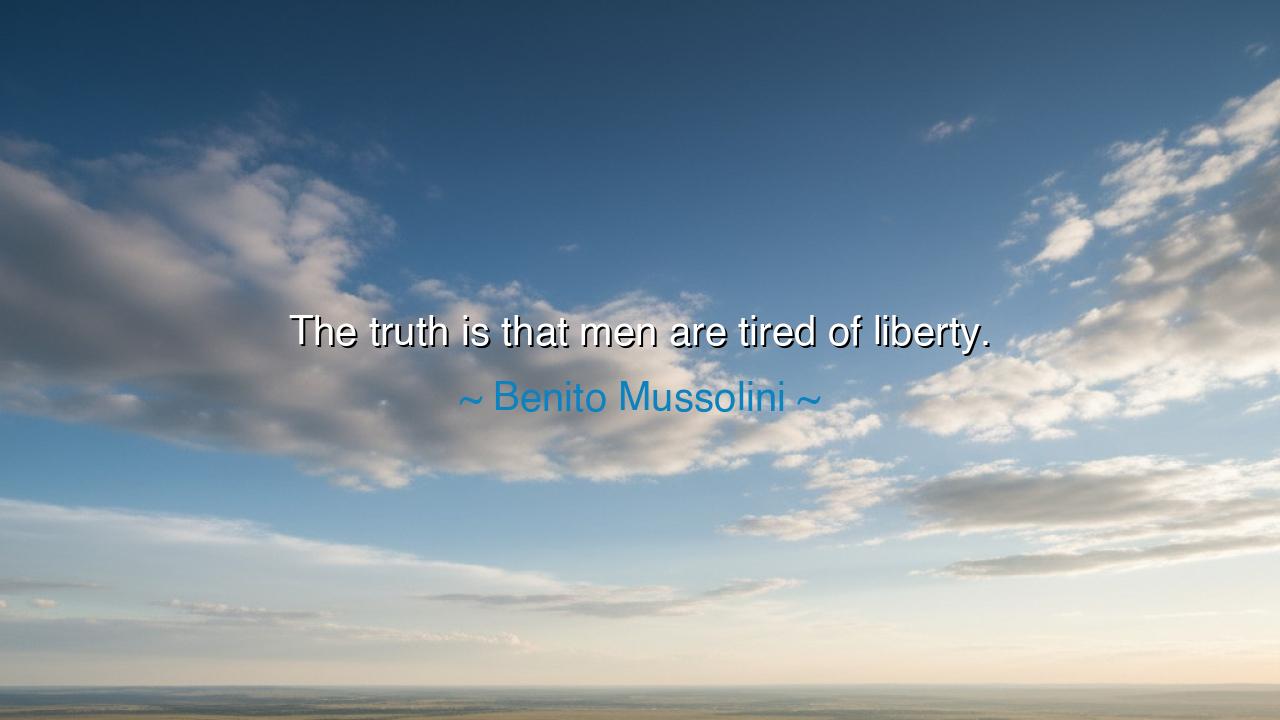
The truth is that men are tired of liberty.






Listen, O children of wisdom, to the words of Benito Mussolini, a leader whose words and actions shaped the course of history with both fiery ambition and profound consequence. He spoke thus: "The truth is that men are tired of liberty." These words, though born from the shadow of dictatorship, carry within them a deep reflection on the nature of freedom, the burden of liberty, and the complex desires of human beings. Mussolini’s statement reflects a sentiment that has echoed through the ages, revealing that while liberty may be a cherished ideal, it is not always a burden that all men are willing to bear.
At the heart of Mussolini's assertion is the idea that freedom is not an easy path. To be free is to bear the weight of choice, responsibility, and uncertainty. Freedom demands that a man make decisions for himself, face the consequences of his actions, and stand alone in the face of the unknown. For some, the endless demands of personal responsibility can become overwhelming. It is much easier, Mussolini argues, to surrender that freedom in exchange for order, for the comfort of knowing what is expected, for the relief of having decisions made for you. In this sense, Mussolini believed that men, tired of the struggle for personal autonomy, would turn to systems of control and order, even at the cost of their liberty.
This concept is not new. The ancient Greeks, in their philosophical inquiries, grappled with the question of freedom and its inherent responsibilities. Plato, in his works, discussed the nature of the ideal state, where the individual submits to the rule of a wise and just ruler for the good of the whole. For Plato, the freedom of the individual was often seen as a threat to the harmony of society, for the pursuit of personal desires could disrupt the common good. In his vision, freedom could lead to chaos, and thus it was the role of the philosopher-king to guide the people toward a higher order, where the burden of freedom was replaced by the harmony of collective responsibility.
In more recent times, we have seen examples of nations where the people, weary of the endless responsibility that freedom brings, have turned to leaders who promise stability, order, and security. Nazi Germany, under Adolf Hitler, is a stark example of a nation where, after the chaos and destruction of World War I, the people sought a strong leader to restore order, even at the expense of personal liberties. In the aftermath of war, the German people were tired of uncertainty, tired of the struggle for survival, and weary of the endless pursuit of individual freedom. They longed for a strong hand to guide them, a leader who would take away the burdens of choice and responsibility, offering instead the comfort of certainty and the promise of a unified society.
Mussolini’s words also point to the nature of human desire. We are creatures who crave order, and though we may long for freedom in theory, in practice we often seek comfort and security over the responsibility that liberty demands. The freedom of the individual can be a heavy weight, for with it comes the constant pressure of choice, the constant questioning of what is right and what is wrong. In this sense, liberty can become a burden, and many may seek the easier path of submitting to authority, to leaders who promise them a world where decisions are made for them, where their paths are clearly marked and their roles in life are preordained.
However, the lesson of Mussolini’s words, and the danger they represent, lies in the cost of this surrender. While we may long for the comfort of a world without the weight of freedom, we must remember that in the absence of freedom, we lose something irreplaceable—our human dignity, our ability to choose, and our responsibility to ourselves. When we trade our liberty for the promise of order, we risk becoming subjects, not citizens, and our personal agency is lost. True freedom is not an easy path, but it is the only path that allows us to live with purpose, creativity, and the right to shape our own destiny.
And so, O children of wisdom, the lesson here is not just a reflection on history, but a call to each of us in our own time. Do not be seduced by the false comfort of surrendering your freedom, for the price is high, and the reward is not the peace that is promised, but the loss of your soul. Embrace the challenge of freedom, for it is in the struggle that we find our true strength, our true character, and our true potential. Let us not tire of liberty, but let us recognize that the burdens it places upon us are the very source of our greatness. May we always choose to carry the weight of our own decisions and to walk the path of freedom with courage and conviction, knowing that it is this path that leads to a life of true fulfillment and purpose.






AAdministratorAdministrator
Welcome, honored guests. Please leave a comment, we will respond soon